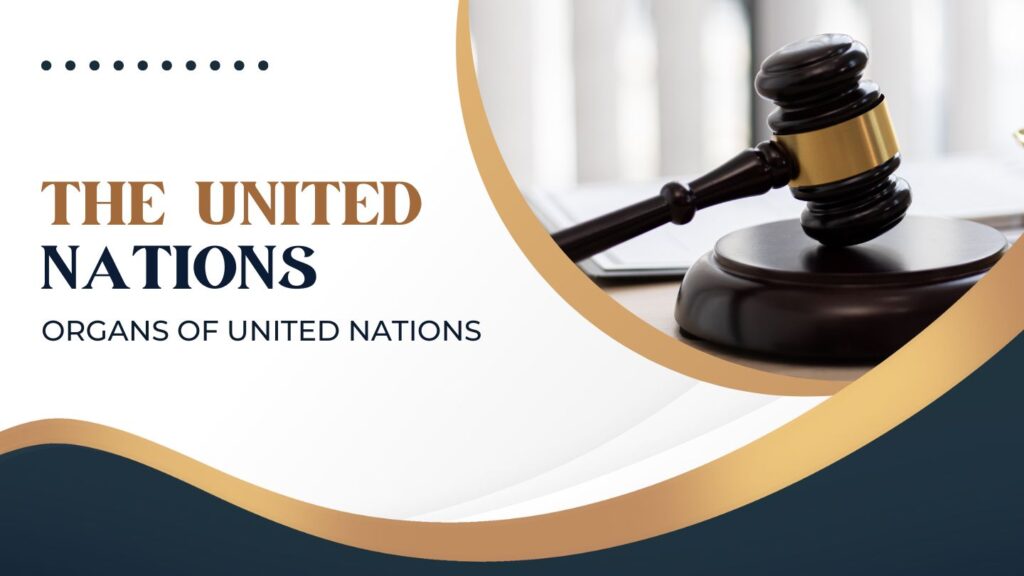United Nations (2023) – Organs of United Nations | United Nations Security Council | United Nations General Assembly | Organs of United Nations. Through this Article we will go through the United Nations and All its Organs in detail. This article will provide you with every thing you need to know about the United Nations and its organs.

United Nations
The United Nations (UN) is an international organization founded in 1945. It is currently made up of 193 Member States. Its charter was signed in San Francisco on June 26, 1945 and came into existence on October 24, 1945 after 51 countries have signed the charter. Its predecessor, the League of Nations, created by the Treaty of Versailles in 1919 was disbanded in 1946. Its mission is to maintain international peace and security, developing friendly relations among nations and promoting social progress, better living standards and human rights. It is headquartered in New York, USA.
Purpose of United Nations
1. To maintain international peace and security, and to that end: to take effective collective measures for the prevention and removal of threats to the peace, and for the suppression of acts of aggression or other breaches of the peace, and to bring about by peaceful means, and in conformity with the principles of justice and international law, adjustment or settlement of international disputes or situations which might lead to a breach of the peace;
2. To develop friendly relations among nations based on respect for the principle of equal rights and self-determination of peoples, and to take other appropriate measures to strengthen universal peace.
3. To achieve international co-operation in solving international problems of an economic, social, cultural, or humanitarian character, and in promoting and encouraging respect for human rights and for fundamental freedoms for all without distinction as to race, sex, language, or religion; and
4. To be a Centre for harmonizing the actions of nations in the attainment of these common ends.
The Secretary-General is chief administrative officer of the Organization, appointed by the General Assembly on the recommendation of the Security Council for a five-year, renewable term.
Organs of United Nations

There are 6 Organs of United Nations as provided under
General Assembly,
Security Council,
Economic and Social Council,
Trusteeship Council,
International Court of Justice
Secretariat
General Assembly

The General Assembly is the main deliberative, policymaking and representative organ of the UN. All 193 Member States of the UN are represented in the General Assembly, making it the only UN body with universal representation. Each year, in September, the full UN membership meets in the General Assembly Hall in New York for the annual General Assembly session, and general debate, which many heads of state attend and address. Decisions on important questions, such as those on peace and security, admission of new members and budgetary matters, require a two-thirds majority of the General Assembly. Decisions on other questions are by simple majority.
It appoints Secretary General of UN based on the recommendations given by Security Council. General Assembly elects Non-Permanent members in Security Council and elects Members for Social and Economic Council. Along with Security Council, General Assembly elects Judges to International Court of Justice. There are 193 UN member states, each with a vote in the General Assembly. The President of the General Assembly is elected each year by assembly to serve a one-year term of office. It has the power to censure states for
violating UN Charter principles.
United Nations Security Council

It has primary responsibility, under the UN Charter, for the maintenance of international peace and security. The Security Council is made up of fifteen member states, consisting of five permanent members—China, France, Russia, the United Kingdom, and the United States—and ten non-permanent members elected for two-year terms by the General Assembly on a regional basis. “Veto power” refers to the power of the permanent member to veto (Reject) any resolution of Security Council.
The unconditional veto possessed by the five governments has been seen as the most undemocratic character of the UN. While other organs of the UN can only make recommendations to member states, the Security Council has the power to make binding decisions on member states. When a dispute leads to hostilities, the Council’s primary concern is to bring them to an end as soon as possible. In that case, the Council may:
Issue ceasefire directives that can help prevent an escalation of the conflict;
Dispatch military observers or a peacekeeping force to help reduce tensions, separate
opposing forces and establish a calm in which peaceful settlements may be sought.
Beyond this, the Council may opt for enforcement measures, including:
Economic sanctions, arms embargoes, financial penalties and restrictions, and travel bans;
Severance of diplomatic relations;
Blockade;
Or even collective military action.
International Court of Justice
The International Court of Justice is the principal judicial organ of the United Nations. It was established in June 1945 by the Charter of the United Nations. The ICJ is the successor of the Permanent Court of International Justice (PCIJ), which was established by the League of Nations in 1920.
It is seated at the Peace Palace, Hague (Netherlands), and the only principal organ of UN to be not located in New York. It settles legal disputes between states and gives advisory opinions to the UN and its specialized agencies. It hears cases related to war crimes, illegal state interference, ethnic cleansing, and other issues.
It is presided over by 15 judges elected to 9 year terms by the UNGA and the UNSC from a list of people nominated by the national groups in the Permanent Court of Arbitration. A candidate needs to get an absolute majority in both the chambers i.e. the UNGA and the UNSC. 5 judges are elected every 3 years to ensure continuity within the court and are eligible for re-election. No two judges can be the nationals of the same country.
Also Read Capital Punishment
The Court settles legal disputes between nations only and not between individuals, organizations and private enterprises in accordance with international law. The Court can only hear a dispute when requested to do so by one or more States. It cannot deal with a dispute of its own motion.
United Nations Economic and Social Council
The Economic and Social Council or the ECOSOC is one of the six principal organs of the United Nations. It is an important topic for the UPSC international relations segment. In this article, you can read all about the ECOSOC, its functions and role within the UN system and India’s relations with it. It play very Important Role in United Nations:
- It plays the important role of acting as a link between the diverse body of agencies, conventions and organizations within the UN.
- ECOSOC plays a leading role in identifying emerging challenges, encouraging innovation, and attaining a balanced integration of the three pillars of sustainable development—economic, social and environmental.
- It acts as a gateway for UN partnership & participation by the rest of the world.
- It is an international meeting point for governments, leaders, academicians, policymakers, parliamentarians, NGOs, etc.
United Nations Trusteeship Council
The United Nations Trusteeship Council, one of the principal organs of the United Nations, was established to help ensure that non-self-governing territories were administered in the best interests of the inhabitants and of international peace and security. The trust territories—most of them former mandates of the League of Nations or territories taken from nations defeated at the end of World War II—have all now attained self-government or independence, either as separate nations or by joining neighboring independent countries. The last was Palau, which became a member state of the United Nations in December 1994. Subsequently, having successfully fulfilled its own mandate, the Trusteeship Council was suspended.
Important MCQs of Intellectual Property Rights
United Nations Secretariat
The United Nations Secretariat carries out the day-to-day work of the UN as mandated by the General Assembly and the Organization’s other main organs. The Secretary-General is the head of the Secretariat, which has tens of thousands of UN staff members working at duty stations all over the world. UN staff members are recruited internationally and locally, and work in duty stations and on peacekeeping missions. Serving the cause of peace in a violent world is a dangerous occupation. Since the founding of the United Nations, hundreds of brave men and women have given their lives in its service.
3 thoughts on “United Nations (2023) – Organs of United Nations”